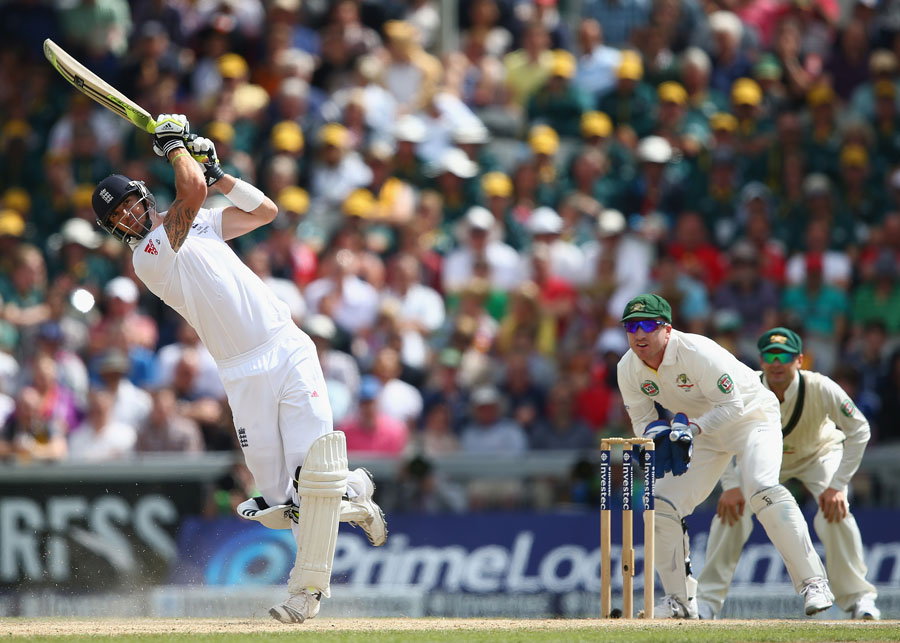
Same risk, different outcome: when a batsman goes after a bowler, he could end up being dismissed or hitting a six © Getty Images
The World Bank recently asked me to give a speech at a forum in London called "Understanding Risk". Initiall, I was unsure how I could approach the subject. How could I, an ex-sportsman turned writer, address financial experts on the question of risk?
On reflection, I realised there is another profession, followed around the world and relentlessly scrutinised, that relies almost entirely on the assessment of risk. Without risk, there can be no reward. Without risk, there are no triumphs. Without risk, there can be no progress.
And yet this entire profession, this whole sphere of human endeavour, doesn't really understand risk at all. It uses the term sloppily, even incorrectly. It criticises good risks and celebrates bad risks. It cannot distinguish between probabilities and outcomes.
It has changed its approach to risk, swapping one flawed approach for the opposite mistake. In the old amateur days, when it was run and managed like an old boys' club, there was little or no calculation of risk - merely unscientific anecdotes and old wives' tales. But the brave new dawn of social science didn't prove any better. In fact, it might be even worse. People put too much faith in maths, metrics and quantification. It has lurched from old boy's network to a pseudo-science - without pausing en route where it ought permanently to reside: with the acknowledgment that risk requires subjective but expert judgement. There is no perfect formula. If there was, everyone with a brain would succeed.
The sphere I describe, of course, is not finance or banking but professional sport. Sporting strategy - sometimes analytical and planned, sometimes instant and intuitive - always revolves around the assessment of risk. Taking risks is what sportsmen do for a living. And yet the analysis of risk does not match this practical reality. We usually talk in clichés not truths, often criticising good risks and praising bad risk-taking.
Here are four ways the sports world often misinterprets risk.
Risk is everywhere
In cricket, every attacking shot played by a batsman carries an element of risk, no matter how small. Stop playing shots and you cannot score runs. "You miss 100% of the shots you don't take," as Wayne Gretzky, the greatest ice hockey player of all time, put it.
And it is amazing when you stop playing attacking shots how much better bowlers bowl. Effective risk-taking has an intimidatory effect. Total risk-aversion the opposite: it emboldens your opponent, making him feel safe and relaxed.
In football, when a midfield player advances up the pitch, he is trying to orchestrate a goal while also reducing his own team's defensive protection. In risking creating a goal, he increases the risk of conceding one. Defenders, too, constantly weigh risks. Pressing the opposition, trying to get the ball back from them, is a risk. In moving up the pitch without possession, you create space behind you - if they are good enough to keep the ball and get past you.
But the alternative - safety-first defending - brings risks of another kind. If you never press, and always retreat into the safety of deep defensive organisation, then you rarely regain the ball. You dig your own trench, unable to threaten or frighten the opposition, merely sitting there waiting for the next wave of attack.
Tennis is all about risk. With your groundstrokes, if you are determined never to lose a point by hitting the ball long, not even once, then sadly you won't play with enough depth to make life difficult for your opponent. You will make zero errors and still lose.
And when it's your turn to return, if you never run round your backhand in the hope of hitting a forehand winner, then you will allow your opponent to settle into a comfortable serving rhythm. In the pursuit of good returning, you have to risk getting aced. You have to risk failure in the short term to give yourself a chance in the long term. You have to dare to be great.
Being right is not the same thing as events turning out well
You can be right and fail. You can be wrong and succeed.
| | | |
|
| Sport is about problem-solving. And the best way to discover new, better methods is to allow people to experiment through trial and error. Don't see what everyone else is doing and copy it. Find a better way |
|
| | |
|
Sport rarely allows for this. We say that winning "justified the decision", a classic failure to distinguish between ex ante and ex poste thinking. Instead, the real question should be: would I do the same thing again, given the information I had at the time? Coaches and captains often make the right calls and lose. And they often make the wrong calls and win. It is stupid to judge a man's judgement on a sample size of one event.
The same point applies to risks taken by players. An unthinking tribal fan will shout "hero" when a risk-taking batsman hits a six, then scream "idiot" when the same shot ends up in a fielder's hands.
What a champion to take on the bowler! What a fool to take such a risk! The inconsistency here is not the batsman's, it is the spectator's. Coward/hero, fool/champion, disgrace/legend. The same risk can lead to either assessment.
Many crucial risks are invisible
There are risks that no one sees that still have to be taken. Critics delude themselves that the only form of bravery in sport is guts and determination. At least as important is nerve, or, put differently, the capacity to endure risk imperceptibly.
When I was commentating with Sourav Ganguly at Lord's last week, he told me that Virender Sehwag used to shout, "He missed a four!" while he was in the dressing room watching team-mates batting. Ganguly quite rightly added that missing an opportunity to do something good is just as much of a mistake as making a visible error.
Many teams imperceptibly yield an advantage through timidity, fearfulness, and anxiety about standing out for the wrong reasons - an advantage they never subsequently reverse.
During the last Ashes series, I used this column to develop the metaphor of looking at sport as an old-fashioned battlefield. As the front lines engage and each army tries to advance, the direction of travel will be determined by tiny acts of skill and bravery - and equally imperceptible acts of risk aversion.
Somewhere on the front line, an infantryman inches a foot closer to his ally, hiding his own shield slightly behind his friend's. Hence one man becomes fractionally safer - but if the action is repeated a thousand times, the front line becomes significantly narrower and weaker as a whole. No one individual can be singled out as a hopeless failure. But the group suffers a collective diminution.
So it is in sport. When a batsman fails to hit a half-volley for four because he is too cautious, an opportunity is wasted to exploit an advantage offered to his team.
We talk a great deal about momentum, but not enough about how momentum is created. Once the whole army is retreating, even the bravest soldiers can fail to hold the line. We talk of courage when the tide has already turned. So in place of the usual clichés, "out-fought", "out-toughed", "out-hungered", I have a simpler word: outplayed. Or, even better, "quietly, perhaps indiscernibly, defeated by superior risk-taking".
The essential risk of being prepared to look silly
This is how sport moves forward. In 1968, a professional athlete had a crazy idea. Madder still, he had this idea just before the tournament event of his life. He wanted to rip up the coaching manual and do it all his own way. His coaches told him to forget about it, to stick with the old way of doing things, not to rock the boat.
He ignored them. He was a high-jumper, and he instinctively wanted to go over the bar head first, back down - not, as everyone else did, leg first, face down. At the 1968 Mexico Olympics, despite everyone telling him he was mad, he went ahead with his revolutionary technique. And how did it work out? He won a gold medal and set a new world record. He was called Dick Fosbury and he'd just invented the Fosbury Flop.
Sport is about problem-solving. A challenge is set: kick the ball into the net; hit the ball over the boundary; jump over the bar. From then on, solutions evolve, sometimes deliberately, sometimes by accident. And the best way to discover new, better methods is to allow people to experiment through trial and error. Don't see what everyone else is doing and copy it. Find a better way.
The left-field question is the one to ask. Why shouldn't I jump over the high-jump bar head first? Why shouldn't I aim my sweep shot towards off side where there aren't any fielders (the reverse sweep, the switch hit)?
Sport moves forward when it is irreverent, resistant to authority. The greatest cricketer of all time, Don Bradman, used a technique that no one has dared to try out a second time. His bat swing started way out to the side, rather than as a straight pendulum line from behind him.
Let me repeat. The method that made Bradman one and a half times better than the second-best player was consigned to the rubbish bin of sporting ideas. Bradman was prepared to look stupid by risking a unique rather than textbook technique. Others have been unwilling or unable to follow.
Bradman, however, benefited from one huge slice of luck. He escaped the greatest risk that can befall any genius: formal education. He learnt to bat on his own, using the empirical method, without a coaching manual. As a child he would repeatedly hit a golf ball against the curved brick base of his family's water tank.
Here is a startling thought. How many Bradmans were persuaded to try the usual technique? How many Fosburys were talked out of taking a chance?
In the course of trying to be different and better, you have to bear the risk of being different and worse.



